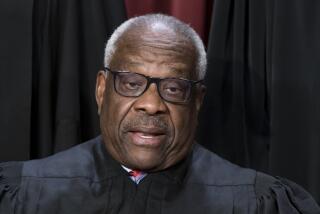Justice prefers the simple life
WASHINGTON â After 18 years in a city he loved to hate, Justice David H. Souter can finally bid Washington farewell.
For each of those years, Souter worked seven days a week through most of the Supreme Courtâs October-to-July terms, staying at his office more than 12 hours a day. His lunch most often consisted of yogurt and an apple eaten at his desk; his supper a quickly prepared late-night meal at the apartment he rented a few miles away.
He once told acquaintances he had âthe worldâs best job in the worldâs worst city.â
âWhen the term of court starts I undergo a sort of annual intellectual lobotomy and it lasts until the following summer when I sort of cram what I can into the summertime,â Souter said wryly in March during a rare public speech. The comment drew laughter from the audience, humanities teachers at the American Academy of Arts and Sciences.
A history buff renowned among friends and former clerks as an excellent storyteller with a wonderful sense of humor, Souter headed for his native New Hampshire as soon as he could at the end of the courtâs term every year.
âHe doesnât fit what I think most people would assume, that heâs Silent Cal, the Calvin Coolidge-type New Englander,â said Meir Feder, a New York lawyer who worked for Souter at the Supreme Court.
Souter was appointed to the court in 1990 by President George H.W. Bush after just a few months as a federal appeals court judge, but with many years experience as a prosecutor, attorney general, trial judge and state Supreme Court justice in New Hampshire.
Virtually unknown outside his home state, he was viewed warily both by liberals and conservatives. Liberals feared that his appointment by an abortion opponent would help spell the end of the guarantee of abortion rights. It didnât; Souter in 1992 voted to uphold Roe vs. Wade. In the same year he also voted to maintain the courtâs longtime ban on officially sponsored prayers in public schools.
Conservatives worried that in his praise for the liberal lion he succeeded, Justice William Brennan, Souter was charting a much more moderate course than they would have liked or expected from a Republican nominee.
Eighteen years later, Souter was firmly among the courtâs liberals.
More to Read
Get the L.A. Times Politics newsletter
Deeply reported insights into legislation, politics and policy from Sacramento, Washington and beyond. In your inbox three times per week.
You may occasionally receive promotional content from the Los Angeles Times.










